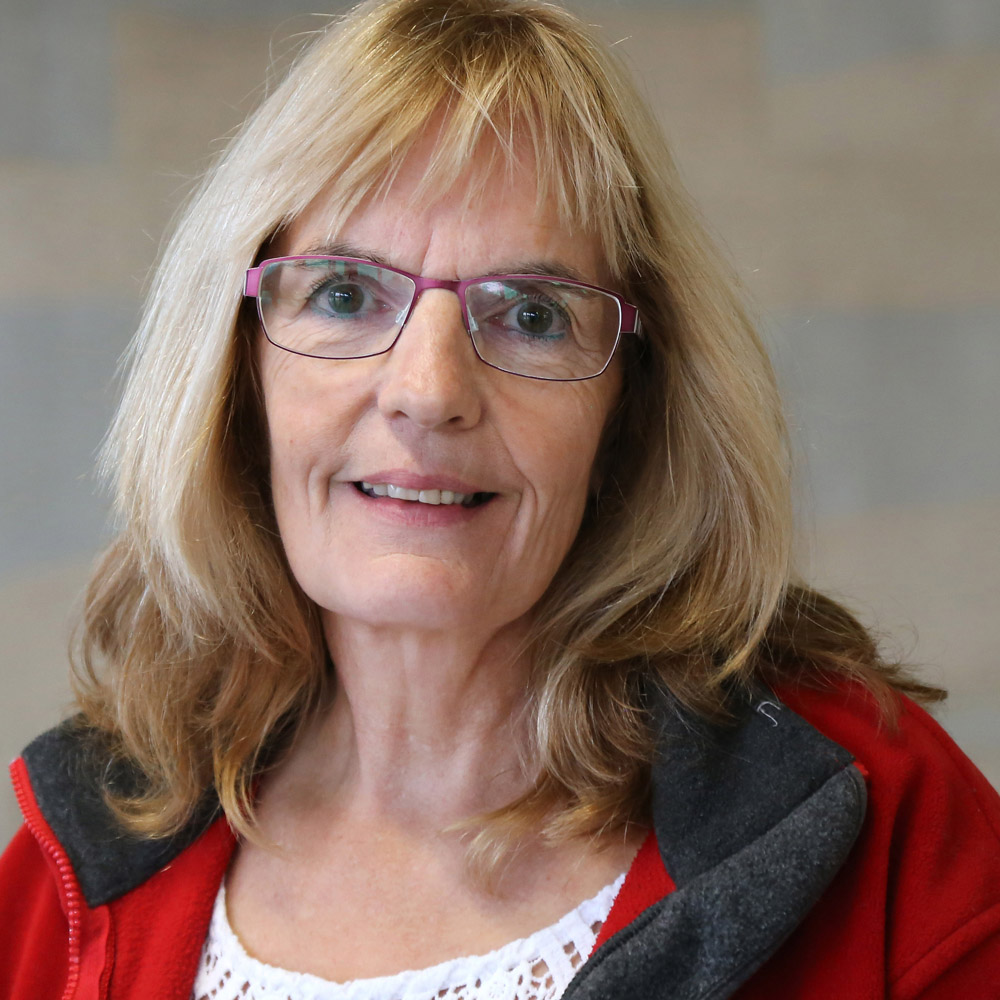Prof Florence Myles

-
Email
fmyles@essex.ac.uk -
Location
Colchester Campus
-
Academic support hours
Mondays 15.00 – 16.00 Fridays 16.00 – 17.00
Profile
Biography
Florence Myles graduated from the University of Sheffield with a PhD in Second Language Acquisition. She worked at the University of Southampton before taking up a Chair in French Linguistics at Newcastle University in 2004, where she was founding Director of the Centre for Research in Linguistics and Language Sciences. She joined the University of Essex in 2011 as Professor of Second Language Acquisition and is the founding Director of LaDeLi (Centre for Research in Language Development throughout the Lifespan). Her research interests are insecond language acquisition (SLA), especially of French although she has also worked on Spanish SLA, and she is particularly interested in morphosyntactic development, and in theory building in the field of SLA. She has directed many research projects funded by the ESRC, AHRC and the British Academy, which have all had the dual aim of investigating learner development in French/Spanish and of constructing an electronic database of French/Spanish learner language oral corpora, available on the web to the research community (www.flloc.soton.ac.uk; www.splloc.soton.ac.uk). She has recently directed an ESRC-funded project investigating the role of age in instructed SLA of French (2009-11). She was President of EUROSLA (European Second Language Association) from 2011 to 2015. She was Editor of the Journal of French Language Studies (CUP) until 2012, and is on the Editorial Board of Second Language Research, of Language Teaching, of the EUROSLA Yearbook, and of the Revue Française de Linguistique Appliquée. She is the founding Chair of RiPL (Research in Primary Languages network; www.ripl.uk) and co-author (with R. Mitchell and E. Marsdsen) of Second Language Learning Theories, now in its 4th edition.
Qualifications
-
BA (University of Sheffield)
-
MA (University of Sheffield)
-
PhD (University of Sheffield)
Research and professional activities
Research interests
The development of morphology and syntax in second language acquisition
The role of formulaic language in SLA
The role of age in SLA (in both naturalistic and instructed learners)
The use of computerised methodologies in SLA research, especially in the context of Oral Learner Corpora
SLA theory-building
Current research
Learning French from ages 5, 7 and 11: an investigation into starting ages, rates and routes of learning amongst early foreign language learners (ESRC funded project)
Her recent ESRC funded project compared linguistic development, attitudes and learning strategies in these 3 age groups, following a similar curriculum delivered by the same teacher over 40 hours of instruction. She is currently analysing the data and writing it up for articles on the different dimensions of the project. See a short presentation of this research and its findings. See a film of a typical project classroom (with the 7 year olds), accompanied by an interview with the teacher employed by the project.. A short article in The Conversation on 'Is it a case of the 'younger the better' for children learning a new language?'.
Conferences and presentations
MYLES, F. 2016. Keynote. The younger the better? A comparison of 5, 7 and 11 year olds learning French in the classroom in the UK. Language in Focus Conference, Istanbul, March 2016- Invited plenaires/keynotes
Istanbul, Turkey, 2016
MYLES, F. 2016. Plenary. The psycholinguistic construct of formulaicity in second language learners: issues of conceptualisation and identification. FLaRN conference, Swansea, January 2016- Invited plenaires/keynotes
Swansea, United Kingdom, 2016
MYLES, F. 2015. Keynote. The younger the better? What is the best age to learn foreign languages in schools?. Sarajevo, December 2015- Invited plenaires/keynotes
Sarajevo, Bosnia and Herzegovina, 2015
MYLES, F. 2015. Keynote. The interaction between formulaic language and generative competence in early second language grammars. Sarajevo, December 2015- Invited plenaires/keynotes
Sarajevo, Bosnia and Herzegovina, 2015
MYLES, F. 2014: Plenary: The role of formulaic sequences at different stages of foreign language learning, International Symposium on Multilingualism and Second Language Acquisition, Universidad del País Vasco, Vitoria- Invited plenaires/keynotes
Leioa, Spain, 2014
MYLES, 2013: The younger the better? Comparing 5, 7 and 11 year olds learning French in the classroom. Public lecture at Cambridge Festival of Ideas- Invited plenaires/keynotes
Cambridge, United Kingdom, 2013
MYLES, F. 2012: Comparing 5, 7 and 11 year olds learning French in the classroom in the UK, invited talk, Thessaloniki.- Invited plenaires/keynotes
Thessaloniki, Greece, 2012
MYLES, F. 2012: Public lecture, University of East Anglia The younger the better? Comparing 5, 7 and 11 year olds learning French in the classroom.- Invited plenaires/keynotes
Norwich, United Kingdom, 2012
MYLES, F. 2012: Opening keynote The younger the better? Comparing 5, 7 and 11 year olds learning French in the classroom. Essex Language Conference for teachers.- Invited plenaires/keynotes
2012
MYLES, F. 2011: Opening keynote Learner corpora and SLA theory. Conference on Learner Corpora, Louvain-la-Neuve, Belgium, September 2011 - Invited plenaires/keynotes
Louvain-la-Neuve, Belgium, 2011
MYLES, F. 2011: Plenary address L2 corpora and second language acquisition research. EUROSLA (European Second Language Association) annual conference, Stockholm, Sweden, September 2011 - Invited plenaires/keynotes
Stockholm, Sweden, 2011
MYLES, F. 2010: Plenary Address. Linguistic development in classroom learners of French.Annual conference of the Association for French Language Studies, Cambridge, September 2010. - Invited plenaires/keynotes
Cambridge, United Kingdom, 2010
MYLES, F. 2010: French Linguistics in the UK. Séminaire des études françaises. French Embassy, London, February 2010- Invited plenaires/keynotes
London, United Kingdom, 2010
MYLES, F. 2008: Le développement du lexique et de la syntaxe en début d'apprentissage du français L2: processus parallèles ou interdépendants? Plenary opening address of conference on La place de lintervention dans une acquisition des compétences en interaction. Le cas du FLE, Free University, Brussels, March 2008- Invited plenaires/keynotes
Brussels, Belgium, 2008
MYLES, F. 2008: Building a comprehensive SLA theory: the Holy Grail? Invited talk, BAAL/CUP seminar on Conceptualising learning in Applied Linguistics. Newcastle University, June 2008. - Invited plenaires/keynotes
Newcastle upon Tyne, United Kingdom, 2008
MYLES, F. 2008: The nature and development of L2 French. Keynote address, Conference on the nature and development of L2 French, University of Southampton, 2008. - Invited plenaires/keynotes
Southampton, United Kingdom, 2008
MYLES, F. 2007: plenary at the Symposium on Complexity, fluency and accuracy in second language use, learning and teaching, Brussels, March 2007.- Invited plenaires/keynotes
Brussels, Belgium, 2007
MYLES, F. 2007: Constitution et exploitation de corpus dapprenants de français langue étrangère, plenary at the conference français des corpus 2, Bristol January 2007.- Invited plenaires/keynotes
Bristol, United Kingdom, 2007
MYLES, F. 2007: The status of formulaic language in early L2 grammars. Plenary at the workshop on Sources of knowledge in second language acquisition research, Salford, February 2007.- Invited plenaires/keynotes
Salford, United Kingdom, 2007
MYLES, F. 2007: The role played by formulaic language in early second language grammars, plenary at the Newcastle Postgraduate conference, June 2007.- Invited plenaires/keynotes
2007
Teaching and supervision
Previous supervision

Degree subject: Psycholinguistics
Degree type: Doctor of Philosophy
Awarded date: 12/6/2023

Degree subject: Linguistics
Degree type: Doctor of Philosophy
Awarded date: 16/9/2022

Degree subject: Applied Linguistics
Degree type: Doctor of Philosophy
Awarded date: 6/7/2022

Degree subject: Linguistics
Degree type: Doctor of Philosophy
Awarded date: 26/5/2022

Degree subject: Linguistics
Degree type: Doctor of Philosophy
Awarded date: 8/6/2018

Degree subject: Linguistics
Degree type: Doctor of Philosophy
Awarded date: 5/6/2018

Degree subject: English Language Teaching
Degree type: Doctor of Philosophy
Awarded date: 27/4/2018

Degree subject: Linguistics
Degree type: Doctor of Philosophy
Awarded date: 4/5/2016

Degree subject: Applied Linguistics
Degree type: Doctor of Philosophy
Awarded date: 16/9/2015

Degree subject: Applied Linguistics
Degree type: Doctor of Philosophy
Awarded date: 18/12/2014
Publications
Journal articles (33)
Mitchell, R. and Myles, F., Teaching and learning foreign languages. Babylonia Journal of Language Education. 2, 78-85
Mitchell, R. and Myles, F., (2024). Lexical frequency and target language input in the primary languages classroom. The Language Learning Journal, 1-15
Solaimani, E., Myles, F. and Lawyer, L., (2023). Testing the Interpretability Hypothesis: Evidence from acceptability judgments of relative clauses by Persian and French learners of L2 English. Second Language Research. 40 (3), 026765832311627-026765832311627
Myles, F., (2022). Attitudes and motivation towards learning French in primary school. Language Teaching for Young Learners. 4 (2), 240-263
Porter, A., Graham, S., Myles, F. and Holmes, B., (2022). Creativity, challenge and culture in the languages classroom: a response to the Ofsted Curriculum Research Review. The Language Learning Journal. 50 (2), 208-217
(2021). Announcing changes to our editorial team and editorial board. International Journal of Learner Corpus Research. 7 (2), 195-196
Costley, T., Gkonou, C., Myles, F., Roehr-Brackin, K. and Tellier, A., (2020). Multilingual and monolingual children in the primary-level language classroom: individual differences and perceptions of foreign language learning. The Language Learning Journal. 48 (5), 643-655
Porter, A., Myles, F., Tellier, A. and Holmes, B., (2020). Supporting foreign languages in an Anglophone world. Language Teaching for Young Learners. 2 (2), 213-239
Mitchell, R. and Myles, F., (2019). Learning French in the UK setting: Policy, classroom engagement and attainable learning outcomes. Apples : Journal of Applied Language Studies. 13 (1), 69-93
Domínguez, L., Arche, MJ. and Myles, F., (2017). Spanish Imperfect revisited: Exploring L1 influence in the reassembly of imperfective features onto new L2 forms. Second Language Research. 33 (4), 431-457
Myles, F. and Cordier, C., (2017). Formulaic sequence (FS) cannot be an umbrella term in SLA : Focusing on psycholinguistic FSs and their identification. Studies in Second Language Acquisition. 39 (1), 3-28
Myles, FJ., (2017). Learning foreign languages in primary schools: is younger better?. Languages, Society and Policy. 1 (1), 1-8
Tracy-Ventura, N. and Myles, F., (2015). The importance of task variability in the design of learner corpora for SLA research. International Journal of Learner Corpus Research. 1 (1), 58-95
DOMÍNGUEZ, L., TRACY-VENTURA, N., ARCHE, MJ., MITCHELL, R. and MYLES, F., (2013). The role of dynamic contrasts in the L2 acquisition of Spanish past tense morphology. Bilingualism: Language and Cognition. 16 (3), 558-577
Dominguez, L., Tracy-Ventura, N., Arche, MJ., Mitchell, R. and Myles, F., (2012). The role of dynamic contrasts in the L2 acquisition of Spanish past tense morphology. Bilingualism: Language and Cognition. 16 (3), 558-577
Myles, F., (2010). Editorial. Journal of French Language Studies. 20 (2), 103-104
Myles, F., (2010). The development of theories of second language acquisition. Language Teaching. 43 (3), 320-332
Myles, F., (2010). Editorial. Journal of French Language Studies. 20 (02), 103-104
Myles, F., (2010). The development of theories of second language acquisition. Language Teaching. 43 (03), 320-332
Myles, F., (2009). Journal of French Language Studies: Policy on Special Issues. Journal of French Language Studies. 19 (1), 1-1
Myles, FJ. and David, A., (2006). recherche dans le domaine de l'interlangue francaise. Rivista di Psicolinguistica Applicata. 6 (3), 79-92
Brumfit, C., Myles, F., Mitchell, R., Johnston, B. and Ford, P., (2005). Language study in higher education and the development of criticality1. International Journal of Applied Linguistics. 15 (2), 145-168
Myles, F., (2005). Interlanguage corpora and second language acquisition research. Second Language Research. 21 (4), 373-391
Ford, P., Johnston, B., Brumfit, C., Mitchell, R. and Myles, F., (2005). Practice Learning and the Development of Students as Critical Practitioners—Some Findings from Research. Social Work Education. 24 (4), 391-407
Myles, F., (2004). From Data to Theory: the Over‐Representation of Linguistic Knowledge in SLA. Transactions of the Philological Society. 102 (2), 139-168
Myles, F. and Mitchell, R., (2004). Using information technology to support empirical SLA research. Journal of Applied Linguistics. 1 (2), 169-196
MYLES, F., (2004). French second language acquisition research: setting the scene. Journal of French Language Studies. 14 (3), 211-232
MYLES, F. and TOWELL, R., (2004). Special Issue on: The acquisition of French as a second language. Journal of French Language Studies. 14 (3), 209-209
Ford, P., Johnston, B., Mitchell, R. and Myles, F., (2004). Social Work Education and criticality: some thoughts from research. Social Work Education. 23 (2), 185-198
Myles, F., Mitchell, R. and Hooper, J., (1999). INTERROGATIVE CHUNKS IN FRENCH L2. Studies in Second Language Acquisition. 21 (1), 49-80
Myles, F., Hooper, J. and Mitchell, R., (1998). Rote or Rule? Exploring the Role of Formulaic Language in Classroom ForeignLanguage Learning. Language Learning. 48 (3), 323-364
Myles, F., (1995). Interaction between linguistic theory and language processing in SLA. Second Language Research. 11 (3), 235-266
HAWKINS, R. and MYLES, F., (1986). DOES EXPOSURE TO WRITTEN FRENCH IMPROVE STUDENTS' PERFORMANCE IN LISTENING COMPREHENSION AND ORAL PRODUCTION? A PILOT STUDY. French Studies Bulletin. 6 (20), 1-3
Books (5)
Mitchell, R., Myles, F. and Marsden, E., (2013). Second Language Learning Theories. Routledge. 1444163116. 9781444163117
Myles, F., Mitchell, R. and Marsden, E., (2013). Second Language Learning Theories. Third edition. Routledge. 978-1-44-416310-0
Johnston, B., Mitchell, R., Myles, F. and Ford, P., (2011). Developing Student Criticality in Higher Education: Undergraduate Learning in the Arts and Social Sciences. Continuum. 9780826441171
Labeau, E. and Myles, F., (2008). The Advanced Learner Variety: The Case of French. Peter Lang. 9783039110728
Roberts, L., Myles, F. and David, A., (2008). EUROSLA (European Second Language Association) Yearbook. John Benjamins. 9789027254580
Book chapters (13)
Myles, F., (2020). Commentary: An SLA Perspective on Learner Corpus Research. In: Learner Corpus Research meets Second Language Acquisition. Editors: Le Bruyin, B. and Paquot, M., . Cambridge University Press. 258- 273. 9781108425407
Tracy-Ventura, N., Paquot, M. and Myles, F., (2020). The future of corpora in SLA. In: The Routledge Handbook of Second Language Acquisition and Corpora. Editors: Tracy-Ventura, N. and Paquot, M., . Routledge. 1351137891. 9781351137898
Myles, F., (2015). Second language acquisition theory and learner corpus research. In: The Cambridge Handbook of Learner Corpus Research. Cambridge University Press. 309- 332. 9781107041196
Myles, F., (2013). Theoretical Approaches. In: The Cambridge Handbook of Second Language Acquisition. Editors: Herschensohn, J. and Young-Scholten, M., . Cambridge University Press. 46- 70. 9781107007710
Myles, F., (2012). Complexity, accuracy and fluency: The role played by formulaic sequences in early interlanguage development. In: Dimensions of L2 Performance and Proficiency: Complexity, Accuracy and Fluency in SLA. Editors: Housen, A., Kuiken, F. and Vedder, I., . John Benjamins. 71- 94. 9789027213051
Ayres-Bennett, W., Beeching, K., Larrivée, P. and Myles, F., (2011). French Linguistics Research and Teaching in UK and Irish HE Institutions. In: French Studies in and for the 21st Century. Liverpool University Press. 141- 154
Ortega, L. and Byrnes, H., (2011). The Longitudinal Study of Advanced L2 Capacities. In: Longitudinal Study of Advanced L2 Capacities. Routledge. 58- 72. 9780203871652
Dominguez, L., Arche, MJ. and Myles, F., (2011). Testing the predictions of the feature-assembly hypothesis: evidence from the L2 acquisition of Spanish aspect morphology. In: BUCLD 35: Proceedings of the 35th annual Boston University Conference on Language Development. Editors: Danis, N., Mesh, K. and Sung, H., . Cascadilla Press. 183- 196. 9781574731651
Myles, F., (2010). Building a Comprehensive Second Language Acquisition Theory. In: Conceptualising 'Learning' in Applied Linguistics. Palgrave Macmillan UK. 225- 239. 9781349312870
(2009). Vocabulary Studies in First and Second Language Acquisition. In: Vocabulary Studies in First and Second Language Acquisition the Interface Between Theory and Application. Editors: Richards, B., Daller, MH., Malvern, DD., Meara, P., Milton, J. and Treffers-Daller, J., . Palgrave Macmillan UK. 147- 163. 9781349302406
Mitchell, R., Dom�nguez, L., Arche, MJ., Myles, F. and Marsden, E., (2008). SPLLOC: A new database for Spanish second language acquisition research. In: EUROSLA Yearbook. Editors: Roberts, L., Myles, F. and David, A., . John Benjamins. 287- 304. 9789027254580
Myles, F., (2007). Using electronic corpora in SLA research. In: Language Learning and Language Teaching. 377- 400
Myles, F., (2005). The emergence of morpho-syntactic structure in French L2. In: Focus on French as A Foreign Language Multidisciplinary Approaches. 88- 113
Conferences (2)
Marsden, E., Myles, F., Rule, S. and Mithcell, R., (2003). Using CHILDES tools for researching second language acquisition
Myles, F., (2000). Change and continuity in second language acquisition research
Grants and funding
2021
Curriculum review of Oak National Academy's online course materials for Key Stage 2 in Modern Foreign Languages (French and Spanish)
Oak National Academy
2017
French-English bilinguals' processing of morphosyntactic structures: the case of cross-linguistic transfer
European Commission (H2020)
Learning (through) a foreign language in the Primary classroom
University of Essex
Contact
Academic support hours:
Mondays 15.00 – 16.00 Fridays 16.00 – 17.00


